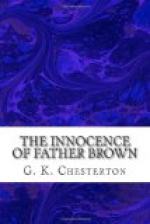“You have to know something of the mind as well as the body,” answered the priest; “we have to know something of the body as well as the mind.”
“Well,” said the doctor, “I think I’ll go and give Quinton his stuff.”
They had turned the corner of the front facade, and were approaching the front doorway. As they turned into it they saw the man in the white robe for the third time. He came so straight towards the front door that it seemed quite incredible that he had not just come out of the study opposite to it. Yet they knew that the study door was locked.
Father Brown and Flambeau, however, kept this weird contradiction to themselves, and Dr. Harris was not a man to waste his thoughts on the impossible. He permitted the omnipresent Asiatic to make his exit, and then stepped briskly into the hall. There he found a figure which he had already forgotten. The inane Atkinson was still hanging about, humming and poking things with his knobby cane. The doctor’s face had a spasm of disgust and decision, and he whispered rapidly to his companion: “I must lock the door again, or this rat will get in. But I shall be out again in two minutes.”
He rapidly unlocked the door and locked it again behind him, just balking a blundering charge from the young man in the billycock. The young man threw himself impatiently on a hall chair. Flambeau looked at a Persian illumination on the wall; Father Brown, who seemed in a sort of daze, dully eyed the door. In about four minutes the door was opened again. Atkinson was quicker this time. He sprang forward, held the door open for an instant, and called out: “Oh, I say, Quinton, I want—”
From the other end of the study came the clear voice of Quinton, in something between a yawn and a yell of weary laughter.
“Oh, I know what you want. Take it, and leave me in peace. I’m writing a song about peacocks.”
Before the door closed half a sovereign came flying through the aperture; and Atkinson, stumbling forward, caught it with singular dexterity.
“So that’s settled,” said the doctor, and, locking the door savagely, he led the way out into the garden.
“Poor Leonard can get a little peace now,” he added to Father Brown; “he’s locked in all by himself for an hour or two.”
“Yes,” answered the priest; “and his voice sounded jolly enough when we left him.” Then he looked gravely round the garden, and saw the loose figure of Atkinson standing and jingling the half-sovereign in his pocket, and beyond, in the purple twilight, the figure of the Indian sitting bolt upright upon a bank of grass with his face turned towards the setting sun. Then he said abruptly: “Where is Mrs. Quinton!”
“She has gone up to her room,” said the doctor. “That is her shadow on the blind.”
Father Brown looked up, and frowningly scrutinised a dark outline at the gas-lit window.




